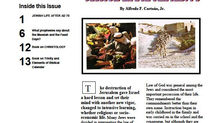ONE GOD AND ONE LORD: Origin of the TWO Powers
- Alfredo F. Cartano. Jr.
- Jan 25, 2024
- 15 min read
The Bible speaks of one God, but how the very word of God translates and uses the word “one” will shock you! Scholars knew this for centuries, and many Bible readers do not comprehend what it means. Today, we will show you the plain truth of the Holy Scriptures—what both the Old and New Testaments explain.
The Book of Genesis speaks of ONE God. We read in Genesis 1:1 In the beginning God created the heaven and the earth. But must read it according to God’s intent and will. In Psalm 33: 4 For the word of the LORD is right; and all his works are done in truth.5 He loves righteousness and judgment: the earth is full of the goodness of the LORD.6 By the word of the LORD were the heavens made; and all the host of them by the breath of his mouth. 7 He gathers the waters of the sea together as an heap: he lays up the depth in storehouses. 8 Let all the earth fear the LORD: let all the inhabitants of the world stand in awe of him.9 For he spoke, and it was done; he commanded, and it stood fast.
Ellicott’s Commentary for English Readers EXCURSUS B: ON THE NAMES ELOHIM AND JEHOVAH-ELOHIM. “Throughout the first account of creation (Genesis 1:1 to Genesis 2:3) the Deity is simply called Elohim. This word is strictly a plural of Eloah, which is used as the name of God only in poetry, or in late books like those of Nehemiah and Daniel. It is there an Aramaism, God in Syriac being Aloho, in Chaldee Ellah, and in Arabic Allahu—all of which are merely dialectic varieties of the Hebrew Eloah and are used constantly in the singular number. In poetry Eloah is sometimes employed with great emphasis, as, for instance, in Psalm 18:31 : “Who is Eloah except Jehovah?” But while thus the sister dialects used the singular both in poetry and prose, the Hebrews used the plural Elohim as the ordinary name of God, the difference being that to the one God was simply power, strength (the root-meaning of Eloah); to the other He was the union of all powers, the Almighty. The plural thus intensified the idea of the majesty and greatness of God; but besides this, it was the germ of the doctrine of a plurality of persons in the divine unity“.
Here, it is defined as a Plural of Eloah. It is a plural of unity.
The First Scofield Reference Bible says: ” Elohim (sometimes El or Elah, English Form God, the first of the three primary names of Deity, it is A UNI-PLURAL NOUN formed from El-Strenght, or the Strong One…”
In our English grammar, it is a compound noun. A compound noun is a noun that is made up of two or more words that function as a single unit to name a person, place, thing, or idea. The most common way to form a compound noun is by putting two nouns together, such as car park, Iceland, shopkeeper, and website 1 Other ways to form compound nouns include adjective + noun (e.g., blackberry, grandstand, greenhouse, small talk) and verb + noun (e.g., breakwater, fall-guy, go-kart, runway). Compound nouns can be written as ONE WORD, with hyphens, or as separate words. In modern English, hyphens are less common than they were in the past. A good learner’s dictionary will tell you how each compound is usually written ¹. Here are some examples:
One word: bathroom, sheepdog, windscreen, couple, family, team, people.
Hyphenated: check-in, fire-fighter, son-in-law
Separate words: bottle opener, New Year’s Day, Prime Minister. Compound nouns normally have the spoken stress on the first part, such as CAR park, BATHroom, WEBsite, BROther-in-law, DOORbell, CHECK-in ¹. However, not all compound nouns follow this rule. Some have spoken stress on the second part, especially in proper names and titles, such as Mount Everest, the Prime Minister, and New YORK. Source:
(1) Nouns: compound nouns – Grammar – Cambridge Dictionary. https://dictionary.cambridge.org/grammar/british-grammar/nouns-compound-nouns.
(2) Compounds – Grammar – Cambridge Dictionary. https://dictionary.cambridge.org/grammar/british-grammar/compounds.
(3) What Is a Compound Noun? – The Blue Book of Grammar and Punctuation. https://www.grammarbook.com/blog/nouns/compound-noun/.
(4) Compound Nouns: 110+ Common Compound Nouns in English • 7ESL. https://7esl.com/compound-nouns/.
(5) Compound Nouns: All You Need to Know | Grammarly Blog. https://www.grammarly.com/blog/compound-nouns/.
In the Bible, the famous word ELOHIM is addressed to a couple. One Flesh. It is from Hebrew ECHAD-one. Genesis 2: 21 So the LORD God caused the man to fall into a deep sleep, and while he slept, He took one of the man’s ribs and closed up the area with flesh. 22And from the rib that the LORD God had taken from the man, He made a woman and brought her to him. 23And the man said:
“This is now bone of my bones and flesh of my flesh; she shall be called ‘woman,’ for out of man she was taken.24 For this reason a man will leave his father and mother and be united to his wife, and they will become ONE flesh.
(Verse 24. Footnote in Biblehub.com. LXX and the TWO will become one flesh ; cited in Matthew 19:5, Mark 10:7–8, 1 Corinthians 6:16, and Ephesians 5:31).
We can understand here that the Creator of all things is a plurality of Beings, acting as UNITY. This is corroborated by simply reading the context. In Genesis 1:26-27, we read: 26Then God said, “Let US MAKE MAN in Our image, after OUR LIKENESS, to rule over the fish of the sea and the birds of the air, over the livestock, and over all the earth itself and every creature that crawls upon it.” 27So God created man in His own image; in the image of God He created him; male and female He created them (Berean Standard Bible).
Yes, it is a plurality but not Trinity (with added third person).
“We have already suggested that the plural name for God, Elohim, denotes God’s unlimited greatness and supremacy…However, when God speaks of himself in plural pronouns (Gen. 1:26; 11:7), IT DOES seem to indicate DISTINCTION OF PERSONS, though only PLURALITY, NOT SPECIFICALLY TRINITY….”(Basic Theology, a popular systematic guide to understanding Biblical truth; p.51, by Charles Ryrie.)
In One God, One Lord: EARLY CHRISTIAN DEVOTION AND ANCIENT JEWISH MONOTHEISM, we read:
“I think we must say that already in the earliest decades we have a genuinely “binitarian” pattern of worship that included Jesus as recipient along with God” (Lary W. Hurtado quoting Gods and the One God; and A. D. Nock, Early Gentile Christianity and Its Hellenistic Background (New York: Harper & Row, 1964).
So, there is One God (the Father), plus a One God (the Word, the Son). ONE Elohim. This is well explained in Proverbs 30: 4 Who has ascended to heaven and come down? Who has gathered the wind in His hands? Who has bound up the waters in His cloak? Who has established all the ends of the earth? What is HIS NAME, and what is the name of HIS SON—surely you know! 5 Every word of God is flawless; He is a shield to those who take refuge in Him. 6 Do not add to His words, lest He rebuke you and prove you a liar.
Is this not what Paul is telling us in Colossians 2:2? New King James Version “that their hearts may be encouraged, being knit together in love, and attaining to all riches of the full assurance of understanding, to the knowledge of the mystery of God, both of the Father and of Christ,“
Apostle John: “20 You, however, have an anointing from the Holy One, and all of you know the truth. 21 I have not written to you because you lack knowledge of the truth, but because you have it, and because no lie comes from the truth. Who is the liar, if it is not the one who denies that Jesus is the Christ? This is the antichrist, who denies THE FATHER AND THE SON. Whoever denies the Son does not have the Father, but whoever confesses the Son has the Father as well (1 John 2:20-23).
How the Bible uses the word “one“. OBSERVING THE DIFFERENT USE OF “ONE”, HEBREW “ECHAD. Group, unit, more than one, team, family, couple. Examples: Genesis 2:24, “ Therefore shall a man[1] leave his father and mother; and shall cleave unto his wife [2], and they [plural] shall ONE flesh”. Also Judges 20:11, “So all the men [plural] of Israel…knit together as ONE man.”
Constructed into ONE; tied together. Example: Exodus 26:11,” And you shall make fifty clasps of brass, and put the clasps into the loops, and couple the tent together, that it may be ONE.”
Harmony; all in one. Example: Exodus 24:11 “And Moses came and told the people all the words of the LORD, and all the judgments: and all the people answered with one voice, and said, All the words which the LORD has said will we do.”
One; singleness. Example: Malachi 2:10, “Have we not all ONE father? has not one God created us? Why do we deal treacherously every man against his brother, by profaning the covenant of our fathers?”
One set. Example: Exodus 12:49, “ONE law shall be to him that is home born, and to the stranger that sojournes among you.”
A day for one year principle. Examples: Nu 14:34, “After the number of the days in which you searched the land, even forty days, each day for a year, shall you bear your iniquities, even forty years, and you shall know my breach of promise.” Eze 4:6, “And when you have accomplished them, lie again on your right side, and you shall bear the iniquity of the house of Judah forty days: I have appointed you EACH [Echad-one] day for a year.”
If you read these examples, reading the word “one“ must consider the very context you are citing or verse quotation. Read it in context, so that no verses will be taken out of meaning on the intent of the writer. Many antichrists, anti-deity, or anti-divinity of Christ failed to consider all presented herein.
SHEMA AND ELOHIM The shema reads, “Hear, O Israel: The LORD our God is one LORD:” (Deuteronomy 6:4). This verse could apply first to the Father and the Son. Or apply to the Father only. Jewish people will outrage with this. But see my point. Take for example the word Elohim, this word is used throughout in the Bible as either gods (plural) or god(singular). And yet its single form ELOAH wasknown with the children of Israel. Eloah plus Eloah is EloHIM (plurality in unity). This is a fact. But the Bible allowed the word “elohim” to be used as single. 1Sa 5:7 says,” And when the men of Ashdod saw that it was so, they said, The ark of the God of Israel shall not abide with us: for his hand is sore on us, and on Dagon our god [used as single, Hebrew ELOHIM].” Jewish people can read this in their Bibles. They know it. In the famous SHEMA, the prophet Moses wrote this verse in context against the “false gods and idols” (Verse 14 of Deuteronomy 6). Compare this to Jeremiah 10:11, “Thus shall you say to them, The gods [used here in plurality, Hebrew ELOHIM] that HAVE NOT MADE the heavens and the earth, even they shall perish from the earth, and from under these heavens.”Isaiah 45:20,“ Assemble yourselves and come; draw near together, you that are escaped of the nations: they have no knowledge that set up the wood of their graven image, and pray to a god that cannot save.”
So, Elohim can be used as single or plural.
The SAME in the Hebrew YHVH, translated as capital LORD in King James Version. It can be used by both the Father, and his Son.
Notice how the capital LORD used in both the Old and the New Testaments.
TO GOD THE FATHER. Exodus 33: 1 ”And the LORD [YHVH] said unto Moses, Depart, and go up hence, thou and the people which thou hast brought up out of the land of Egypt, unto the land which I sware unto Abraham, to Isaac, and to Jacob, saying, Unto thy seed will I give it: 2 And I will send an angel before thee; and I will drive out the Canaanite, the Amorite, and the Hittite, and the Perizzite, the Hivite, and the Jebusite: 3Unto a land flowing with milk and honey: for I will not go up in the midst of thee; for thou art a stiffnecked people: lest I consume thee in the way”.
Here, God the Father is talking to Moses. Take note in verse three, that the entity (God) is saying that He will not personally go up with the Children of Israel, but the Angel will do all the work to save them in his behalf (verse 2).
In Exodus 23, we read a complete message is shown. 21 Beware of him, and obey his voice, provoke him not; for he will not pardon your transgressions: for MY NAME IS IN HIM. 22 But if thou shalt indeed obey his voice, and do all that I speak; then I will be an enemy unto thine enemies, and an adversary unto thine adversaries. 23 For mine Angel shall go before thee, and bring thee in unto the Amorites, and the Hittites, and the Perizzites, and the Canaanites, and the Hivites, and the Jebusites: and I will cut them off.
Now, what is the name that is in the Angel? Of course, look it in verse 1 of Exodus 33. It is YHVH.
TO GOD THE SON (The Angel of the Covenant). To understand the name of the Angel of the Lord, we must go back to Exodus 3. Here, Moses’ first encounter takes place. We could observe the same setting (God the Father reveals himself through this Angel). 1 ”Now Moses kept the flock of Jethro his father-in-law, the priest of Midian: and he led the flock to the backside of the desert, and came to the mountain of God, even to Horeb. 2 And the angel of the LORD (YHVH) APPEARED unto him in a flame of fire out of the midst of a bush: and he looked, and, behold, the bush burned with fire, and the bush was not consumed. 3And Moses said, I will now turn aside, and see this great sight, why the bush is not burnt. 4And when the LORD (YHVH) saw that he turned aside to see, GOD CALLED unto him out of the midst of the bush, and SAID, Moses, Moses. And he said, Here am I. 5And he said, Draw not nigh hither: put off thy shoes from off thy feet, for the place whereon thou standest is holy ground. 6Moreover HE SAID, I am the God of thy father, the God of Abraham, the God of Isaac, and the God of Jacob. And Moses hid his face; for he was afraid to look upon God”.
Then in verse 13 onwards, we read: 13And Moses said unto God, Behold, when I come unto the children of Israel, and shall say unto them, The God of your fathers hath sent me unto you; and they shall say to me, What is his NAME? What shall I say unto them? 14And GOD SAID unto Moses, I AM THAT I AM, and he said, Thus shalt thou say unto the children of Israel, I AM hath sent me unto you. 15And God said moreover unto Moses, Thus shalt thou say unto the children of Israel, The LORD God of your fathers, the God of Abraham, the God of Isaac, and the God of Jacob, hath sent me unto you: this is my name forever, and this is my memorial unto all generations. 16Go, and gather the elders of Israel together, and say unto them, The LORD God of your fathers, the God of Abraham, of Isaac, and of Jacob, appeared unto me, saying, I have surely visited you, and seen that which is done to you in Egypt:
Moses knew that the Angel of the Lord appeared and talked to him. The apostle Paul speaks exactly and testifies what he read: Acts 7:38 ”This is he, that was in the church in the wilderness with THE ANGEL WHICH SPAKE him in the mount Sinai, and with our fathers: who received the lively oracles to give unto us.”
So, this ANGEL is not a literal angel. The word in Hebrew is MALAK מַלְאַ֨ךְ which means, a messenger, envoy, ambassador, or one sent with a message.
Barnes’ Notes on the Bible
”The angel of the Lord – See the note at Genesis 12:7. What Moses saw was the flame of fire in the bush; what he recognized therein was an intimation of the presence of God, who maketh a flame of fire His angel. Compare Psalm 104:4. The words which Moses heard were those of God Himself, as all ancient and most modern divines have held, manifested in the PERSON OF THE SON”.
Jamieson-Fausset-Brown Bible Commentary
”2, 3. The angel of the Lord appeared unto him in a flame of fire—It is common in Scripture to represent the elements and operations of nature, as winds, fires, earthquakes, pestilence, everything enlisted in executing the divine will, as the “angels” or messengers of God. But in such cases God Himself is considered as really, though invisibly, present. Here the preternatural fire may be primarily meant by the expression “angel of the Lord”; but it is clear that under this symbol, the Divine Being was present, whose name is given (Ex 3:4, 6), and elsewhere called the angel of the covenant, JeHoVaH-JESUS.”
The NAME THAT IS IN HIM, in the Son is YHVH. That’s why in Exodus 3, GOD SAID plainly I AM YHVH.
This is very clear, that BOTH the Father and the Son used the name YHVH or The I AM.
That’s why Peter knew that Psalm 16:8-10, and is quoted in Acts 2:25-31. In Acts 2:25 the LORD is in capital, and reading up to verse 31, Peter says it is THE RESURRECTION OF CHRIST. It is not David that is raised from the dead, but the Christ which is the LORD in Psalm 16:8.
It is the Son who came down to earth and became Jesus. He is the same Messenger of the Lord (Messenger of the Father). He is Malak YHVH. He is named in the Old Testament as YHVH like his Father’s name.
Brenton Septuagint Translation (Mal.3:1).
”Behold, I send forth my messenger, and he shall survey the way before me: and the LORD (YHVH), whom YE SEEK, shall suddenly come into his temple, even the ANGEL OF THE COVENANT, whom ye take pleasure in: behold, he is coming, saith the Lord Almighty.”
This LORD is the One who became Jesus in the New Testament, and after his resurrection, God the Father returned his former glory as it was before (John 17:5).
“(‘God has highly exalted him,’ ‘God has raised him to the position of highest honour’) (Phil 2:9). The verb does not indicate that God has exalted Jesus to a higher status than he had previously occupied (whether in pre-existence or in mortal life), but that God has exalted him to a higher status than that of anyone or anything else, i.e. to the pre-eminent position in the whole cosmos. This sense coheres so well with the following phrase (‘and bestowed on him the name that is above [uJpe;r] every name’) that this coherence is surely sufficient to establish the meaning of uJperuvywsen. God gives him the name that is ‘higher’ than any other, his own uniquely divine name, because he exalts him to the status that is higher than any other, his own uniquely divine status. In my view, this statement echoes Isaiah 52:13: ‘Behold, my servant shall understand and shall be exalted (uJywqhvsetai) and shall be glorified greatly’ (LXX). This verse, connected by gezera shawa with passages which speak of God himself as exalted on his heavenly throne (Isa 6:1[LXX: uJyhlou’]; 57:15 [LXX: u{yisto”, ejn uJyhloi'”]), has been understood to mean that the Servant is exalted to God’s own position of pre-eminence on his heavenly throne. “(Paul’s Christology of Divine Identity by Richard Bauckham. page 14).
THE TWO POWERS IN HEAVEN The two divine beings within the Godhead is not a neo-theology in ancient Israel. The problems lie in the modern definition of monotheism (which new discovery gives light that there are many forms of monotheism within Judaism).
”As scholars have increasingly recognized over the past twenty to thirty years, pre-rabbinic Judaism was a much more varied and diverse phenomenon than the more rigid categories of Mishnah and Talmud would allow ”(Christology in the Making. James D.G. Dunn. Page 131).
“They make clear that early Judaism was a variegated phenomenon; this is a useful reminder since many handbooks and commentaries on the New Testament, especially the older ones, may leave one with the impression that there was only rabbinic Judaism and that this is the Jewish “background” (normative or otherwise) of the New Testament, even though the writings usually employed as sources for such Judaism are much later than the first century. Nonetheless, the title of the book is somewhat misleading: Segal does indeed treat “other Judaisms” but also rabbinic Judaism and its relation to the “others”. (The Other Judaisms of Late Antiquity Brown Judaic Studies, 127.Alan F. Segal,Atlanta, GA: Scholars Press).
One of them is the belief in a second God,
”In the case of Paul’s claims about the exalted Christ and of Philo’s view of the Logos as a second god, there is nothing to indicate that their contemporaries found them to be heretical or controversial.”(Frances Young notes the lack of awareness of a ‘Christological problem’ on the part of the NT authors in “Christology and Creation: Towards a Hermeneutic of Patristic Christology” (now published in BETL; the authors are grateful to Prof. Young for allowing them to see a copy of her paper); also Dunn, Partings, 205-6).
”It becomes apparent, therefore, that for one branch of pre-Christian Judaism, at least, there was nothing strange about a doctrine of a deuteros theos, and nothing in that doctrine that precluded monotheism.”(The Gospel of the Memra: Jewish Binitarianism and the Prologue to John. Daniel Boyarin University of California, Berkeley, page 249).
footnote: The phrase “deuteros theos” means “second god” in Greek. It is a term that was used by some ancient writers to refer to a subordinate or intermediate divine being, such as the Logos, the Son, or the Holy Spirit in Christian theology, or the Demiurge in Gnostic cosmology. Some examples of the use of “deuteros theos” are:
Philo of Alexandria, a Jewish philosopher, called the Logos “the second god, who is his Word”. ³
Origen, an early Christian theologian, said that the Son is “a second God, subject to the Father”. ⁴
Valentinus, a Gnostic leader, taught that the Demiurge, the creator of the material world, was “a second god, ignorant of the Father”. ⁵
Source: Conversation with Bing, 1/8/2024 (1) Subordinationism – Wikipedia. https://en.wikipedia.org/wiki/Subordinationism. (2) In ancient Rome who were the many “lords” (KURIOI)?. https://hermeneutics.stackexchange.com/questions/40577/in-ancient-rome-who-were-the-many-lords-kurioi. (3) deutero- | Etimología, Origen y Significado de la Palabra en Inglés …. https://www.etymonline.com/es/word/deutero-. (4) δεύτερος – Wiktionary, the free dictionary. https://en.wiktionary.org/wiki/ (5) Strong’s Greek: 1208. δεύτερος (deuteros) — second – Bible Hub. https://biblehub.com/greek/1208.htm.
For full continual discussion, download our complete PDF article “One God, One Lord: Origin of the Two Powers” HERE.
View our Companion Book at the end of PDF article. Or visit here: Christology-Identity of True Messiah!
Other formats are also available.































Comments